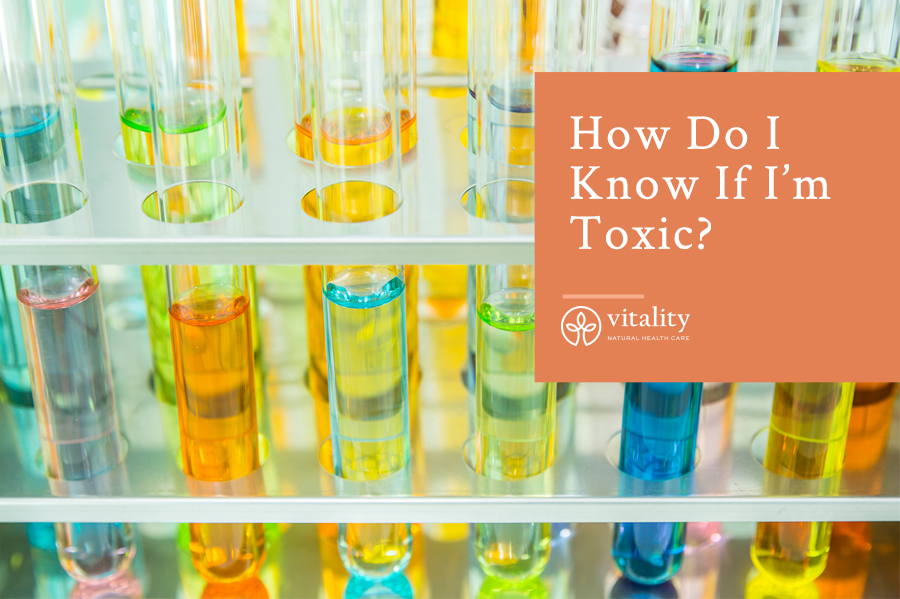We are exposed to toxins every day, and our exposure to environmental pollution, heavy metals, pesticides, preservatives, and cancer-causing chemicals has increased over the last 60 years.
This increase is due in large part to our dependence on plastics and an increase in the demand for affordably priced food. Unfortunately, these chemicals find their way into our water supply, the food we eat, and even our children.
A study conducted by the Environmental Working Group found that umbilical cord blood contains an average of 200 chemicals, including pesticides, consumer product ingredients, and wastes from burning coal, gasoline, and garbage (1).
Many of these toxins can cause or contribute to disease as they hinder the liver’s ability to properly detox. A few signs that toxins are affecting your health are:
Weight Gain
Weight gain or the inability to lose weight is one of the most common symptoms of toxicity that I see in my clinic. If your body is heavily burdened with toxins, your liver will be unable to detox them all naturally. The excess toxins are stored in fat cells which can cause a condition called fatty liver – a build-up of fats, especially triglycerides, in your liver. In addition to environmental toxins, alcohol, processed foods and foods high in sugar and carbohydrates can contribute to this disease.
Fatigue
When any part of your body is overburdened with toxins, it becomes dysfunctional. This dysfunction throws off your body’s equilibrium. In the case of toxicity, the liver becomes overburdened, which can result in hormone imbalance, hypothyroidism, and adrenal fatigue. The changes in hormone production that occur with these three health issues are the prime contributors to feelings of fatigue and exhaustion.
Inflammation
Inflammation is the body’s natural defense against harmful or foreign invaders, and while it can be a beneficial immune response, prolonged or chronic inflammation is the root cause of many illnesses – arthritis, heart disease, and autoimmune disorders, to name a few. Since we are exposed to environmental toxins on a daily basis through the air we breathe, the water we drink, and the food we eat, the liver isn’t always able to flush out toxins efficiently, resulting in internal inflammation.
Skin Issues
Your skin is a physical, chemical, and anti-microbial defense system. When we are exposed to toxic chemicals, the integrity and protective function of the epidermal barrier is compromised. This can increase our chances of inflammation and infection of the skin (2). In addition, if the liver is not able to properly filter and remove the toxins inside the body, the body will attempt to release them through the skin, leading to skin conditions like acne, eczema, and psoriasis.
Brain Fog
Compromised cognitive function often results from systemic toxic overload. If your body is not detoxing properly, there is a buildup of ammonia that inhibits the function and processing of neurochemicals, so memory loss, foggy thinking, and mood changes are common when there are high levels of toxins in the body.
As you can see, when your body and liver are overburdened with toxins, there are a myriad of symptoms. If you are experiencing these symptoms or suspect that you may have high toxicity levels, it is important to get tested. I recommend a test called Toxic Core as it measures the levels of 75 different chemicals we’re exposed to on a daily basis that could be negatively affecting your body.
A Special Note to our blog readers: the Toxic Core assessment is 20% off at Vitality Natural Health Care, call us to book an appointment! (offer expires 04/30/18)
I also recommend getting tested for heavy metals, like lead, mercury, cadmium, and arsenic, as well as genetic testing to get a better understanding of your body’s ability to produce glutathione, a master antioxidant that is essential for detoxification.
Of course, avoiding chemicals is the most effective detox, but it’s simply not possible in the world that we live in. However, knowing the signs and symptoms of toxic overload and maintaining the health of your liver will help to prevent many of the serious health concerns that can arise from having high levels of unchecked chemicals and toxins in the body.
xo,



2 replies on “How Do I Know If I’m Toxic?”
What is the cost of Toxic Core Assessment and the heavy metal test with the 20% off?
Hi Bobbi, it would be best if you give us a call at the office so we can get you all the information you need. Our number is (602) 388 1155. We’re open Monday thru Friday from 9am to 5pm (MST). Thank you!